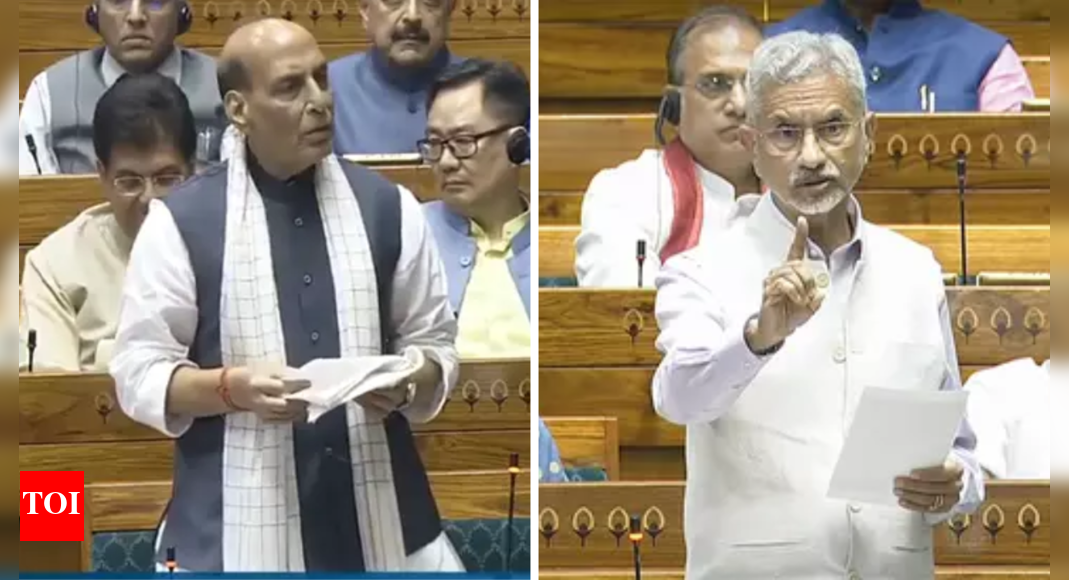In Lok Sabha, the government refuted opposition claims that Operation Sindoor was halted due to US pressure, as alleged by President Trump. Rajnath Singh and S Jaishankar clarified that Pakistan initiated the truce after India achieved its objectives. They em…
Why it matters
- The Indian government has firmly dismissed allegations that the cessation of Operation Sindoor was influenced by external pressure from the United States.
- The clarification from key officials comes amidst ongoing political debates and scrutiny regarding India's defense strategies and diplomatic relations.
- This statement reflects India's stance on sovereignty and its approach to regional security dynamics, particularly concerning Pakistan.
In a recent session of the Lok Sabha, Indian government officials categorically rejected the claims made by opposition leaders that Operation Sindoor, a critical military operation, was suspended due to pressure from the United States, as alleged by former President Donald Trump. Defense Minister Rajnath Singh and External Affairs Minister S. Jaishankar addressed these accusations directly, clarifying that the truce was a voluntary decision made by Pakistan following India’s successful military objectives.
The discussion arose during a heated debate in the Lok Sabha, where Congress MP Gaurav Gogoi raised concerns regarding the alleged US influence on India's military operations. The opposition's assertions suggested that India's decisions were not solely based on its strategic interests but were also swayed by foreign entities, particularly the United States, known for its significant geopolitical impact in the region.
Rajnath Singh firmly stated that the Indian government does not bow to external pressures when it comes to national security. He emphasized that the cessation of hostilities was a direct result of India's successful operations, dispelling any notion that it was a reaction to US intervention. Singh reiterated the importance of India's autonomy in making decisions related to its defense and security policies.
In a similar vein, Jaishankar supported Singh's statements, highlighting that the operational timeline of military strategies is guided by India’s own assessments and objectives, rather than external dictates. He underscored that India has a history of managing its defense matters independently, a sentiment that resonates with the broader public and political sentiment regarding national sovereignty.
The discourse around Operation Sindoor has gained traction not only in political arenas but also among the general populace, especially in light of rising tensions in the region. The operation itself had been launched with specific military objectives aimed at ensuring national security and deterring aggression from neighboring Pakistan. The decision to halt these operations, according to Singh and Jaishankar, was a strategic one taken by India, reflecting its military capabilities and objectives rather than any diplomatic pressure.
The timing of these clarifications is critical, as they come amid ongoing discussions about India's defense policies and regional security. The opposition has often leveraged such narratives to question the government's military strategies, and the recent comments by Singh and Jaishankar serve to counteract those narratives. By firmly asserting India's independence in its military decisions, the government aims to bolster its image of a self-reliant and resilient nation.
Furthermore, these statements reflect a broader strategy by the Indian government to maintain a strong front in the face of external pressures and scrutiny. India's relations with the US, while historically complex, have also been characterized by periods of cooperation and mutual interest, particularly concerning security and defense. However, the current government’s emphasis on sovereignty underlines a commitment to prioritize national interests above geopolitical pressures.
As the political landscape continues to evolve, the implications of these discussions extend beyond the Lok Sabha. They resonate with the electorate, who may view the government’s stance as a reflection of its effectiveness in protecting national interests against foreign influence. The opposition’s narrative, if left unchallenged, could have repercussions on public perception and trust in the government’s handling of defense matters.
In summary, the Indian government’s firm rebuttal of US mediation claims regarding Operation Sindoor signifies its commitment to national sovereignty and independent decision-making in military affairs. This clarification aims to reinforce public confidence in the government's capabilities and intentions regarding national security, amidst an increasingly complex geopolitical environment.











